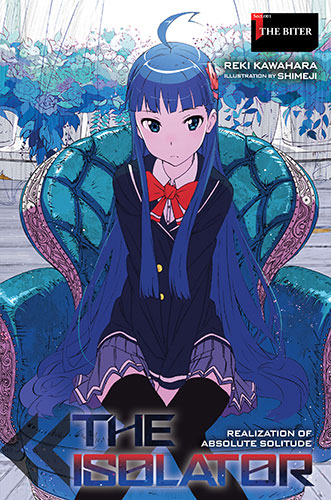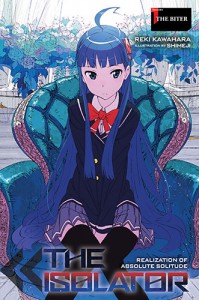By Reki Kawahara and Shimeji. Released in Japan by ASCII Mediaworks. Released in North America by Yen On.
You have to figure that Reki Kawahara is definitely listening to his critics. Sword Art Online features Kirito, who does have deeper issues than people give him credit for, but in the end is pretty much defined by how cool he is. Accel World has Haruyuki, designed to be different, a short, pudgy guy who’s spent much of his life being bullied and has low self-esteem. And now with The Isolator, we have Minoru, whose entire family was massacred while he was hidden in the pantry, tries to live his life in a constant state of the present by never thinking about any past memories, and is, as we see towards the end of the book, actively suicidal much of the time. When Yen talks about angst on the back cover, it’s not kidding.
The girl that you see on the cover is not, of course, the star. Indeed, posing demurely on a chair in the middle of what seems to be a garden of some sort does not actually happen in this book. Instead, Yumiko seems to serve as a sort of inspiration and mentor for Minoru, showing up to save him and being a member of a shadowy organization dedicated to fighting evil. You get the sense that most of her backstory and depth is being held for future volumes. Alas, she’s probably the best developed female character here. The other two, Minoru’s new friend Tomomi and adopted big sister Norie, are there to serve as bait in order to spur our hero onward and nothing more. A pity, we’re seen Kawahara can write better women if he tries.
The villain fares better – a lot better. One of my biggest criticisms of Fairy Dance was the two-dimensional patheticness of its antagonist. The Biter may in fact remind a few people of Sugou, but he’s a lot scarier, a lot more dangerous, and his backstory lets you know where he’s coming from. Indeed, his memories of his stressful childhood and the damage it did to his teeth are harrowing, some of the best writing in the book. That said, he’s also a terrifying psychopath, particularly when combined with the red gem possessing him, and seeing how much he Just Won’t Die forms much of the climax of the book.
As with most Kawahara books, the action may be the biggest reason to read. There are two main fight scenes, and each are told crisply and with care to detail, thrilling the reader into continuously turning the page. In between, we mostly get Minoru’s POV, which can be… disheartening. He’s a messed-up young man, clearly suffering from bad PTSD that is not particularly being treated. It’s realistic yet horribly sad that his goal is to have the chief of the organization he joins at the end (who can erase memories with consent) erase the memory of his existence from everyone who knew him. And his life goals seem to have progressed from ‘I will throw myself in the river and rejoin my dead family’ to ‘I will die nobly in battle and rejoin my dead family.’ It’s scary. Even his superpower is related to cutting himself off from everything.
The second volume only just came out in Japan this February, so don’t expect it till at least next spring. Still, fans of Kawahara’s other works, particularly those who like to see young men shouting at each other and fighting with supernatural powers, will enjoy this.

